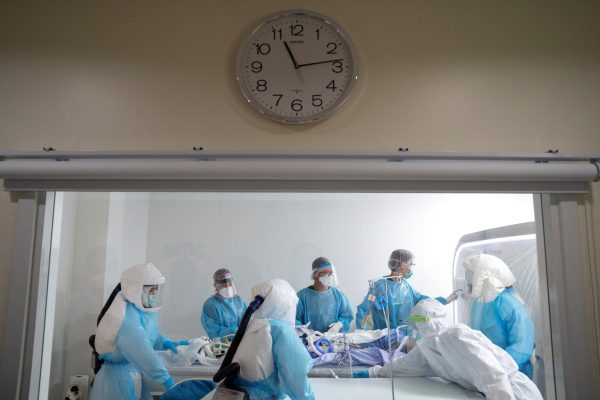Learning from previous infectious disease outbreaks and acting promptly to the changing situation are effective strategies to combat a pandemic — demonstrated this year by South Korea and Vietnam.
There are substantial capacity constraints in the developing world to effectively containing COVID-19, including weak healthcare systems, poor social conditions and inadequate administrative capacity. The grave situation faced by policymakers in the developing world is how to manage a pandemic’s challenges with limited resources, which means tapping into proven good practice. Policy analysis of practices in South Korea, Taiwan and Vietnam shows that countries must adopt policies that incorporate effectiveness, administrative operability, equity and political feasibility.
Weak healthcare systems in developing countries pose one of the main challenges to effective pandemic management. The ratio of healthcare workers to the general population is often below the recommended ratio in the WHO’s guidelines. These countries also lack adequate facilities, and are often ill-equipped with medical supplies and technology to ensure the rapid testing and detection of infections.
Inadequate administrative capacity further restrains effective responses to a pandemic. An effective response requires quick and thorough planning and coordination among different agencies beyond the healthcare system. It comes down to how various resources are mobilised and harnessed under a unified command and how expertly testing, contact tracing and reporting are executed. The ability to communicate risk in a timely, impartial and consistent manner to all citizens yields meaningful results.
A lack of clean water, inadequate sanitation and poor hygiene practices might make it harder for governments to execute measures to contain the virus. A WHO report shows more than 35 per cent of the world population lack access to adequate sanitation. Many people also live in overcrowded and cramped settings that could readily create clusters and spread the infection. This happened in dormitories housing foreign workers in Singapore. Improving personal hygiene in developing countries can also be difficult to achieve within a short period of time, especially given deficiencies of basic amenities.
The WHO has provided technical guidance for handling the pandemic. In formulating policy alternatives, policymakers need to be unbiased and evaluate them appropriately against criteria to ensure the most feasible options are adopted. The below criteria could serve as a guide for policymakers to make informed decisions.
Effectiveness is a crucial criterion and delineates the extent to which a goal is achieved when designing a policy response. Clearly defining effectiveness and making it uniformly understood is essential.
Another criterion is administrative operability referring to how resilient a healthcare system is — including its workforce, infrastructure, medicine, information and public governance. The availability of non-healthcare resources that will enhance the implementation of chosen alternatives is a component that must be considered. Crucially, policymakers must consider how readily these resources can be harnessed without unnecessary bottlenecking.
Equity and the political feasibility of available options should be kept in mind. Equity — in terms of accessibility and fairness of public health measures — is a key determinant of how well a pandemic is controlled. Some countries have loosely implemented measures against COVID-19 because the socioeconomic effects of suppression make stronger measures seem politically infeasible. In choosing an option like a lockdown in cities or countries where the majority of the workforce is informal, governments should be well prepared to handle a crisis that might ensue.
The way forward is to learn from good practices elsewhere. One option is to introduce incremental measures like those of Singapore. This may be an attractive option as it could help conserve scarce resources. But critics argue that populations may become confused about new measures and not comply. This will also aggravate the challenges faced by enforcement personnel.
Another good set of practices are those instituted by Vietnam — a developing country that also shares borders with China — which has managed to keep the number of infected cases to just over 300 with zero deaths. Vietnam divided its localities into ‘high-risk’, ‘at-risk’ and ‘low-risk’ groups to effectively deal with and institute measures related to the pandemic.
The implications for developing countries go beyond simply using a proposed criteria. Effective policymaking must tailor proposed public health measures to local needs to eliminate the various constraints that may emerge if they are ignored and simply applied without close attention to context.
Fatimah Abolanle Odusote, Kiat Wah Ng and Lida No are graduate students at the Lee Kuan Yew School of Public Policy, The National University of Singapore (NUS).
Alfred M Wu is Associate Professor and Assistant Dean at the Lee Kuan Yew School of Public Policy, NUS.
This article is part of an EAF special feature series on the novel coronavirus crisis and its impact.

